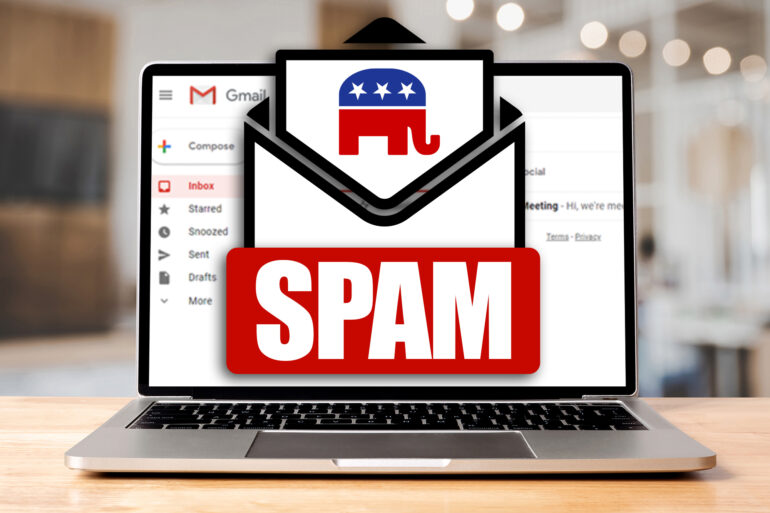🔴 Website 👉 https://u-s-news.com/
Telegram 👉 https://t.me/usnewscom_channel
Google has scrapped Gmail’s controversial use of a “blacklist” that had been flagging Republican fundraising emails as “dangerous” — and sending them directly to spam, The Post has learned.
As The Post exclusively reported last month, the GOP consulting firm Targeted Victory warned clients that Gmail was improperly flagging emails with links to the GOP fundraising platform WinRed – blocking them from inboxes and tagging them with a scary, red warning label that said “seems dangerous”.
At the same time, fundraising pitches from ActBlue, a platform for Democrats, were delivered untouched, according to Targeted Victory.
Republicans have accused Google of suppressing their fundraising emails for years, claiming it’s part of broader anti-conservative bias at the tech giant. In July, the Missouri attorney general sent letters to Google CEO Sundar Pichai and other Big Tech companies demanding to know whether their AI chatbots were skewed against President Trump.
A 2022 study by researchers at North Carolina State University found that Gmail flagged 59% more Republican fundraising emails as spam than Democratic ones during the leadup to the 2020 presidential election.
In WinRed’s case, the GOP-boosting group learned that its emails were being flagged due to Google’s reliance on Netherlands-based SURBL BV, a self-titled “intelligence and reputation services” firm, sources close to the situation said.
SURBL maintains datasets that are widely used to scan and block emails suspected of containing spam, adding them to a “blacklist” that prevents them from being delivered.
WinRed reached out to SURBL directly about the apparent bias, and on Aug. 20 the Dutch firm responded that it would remove WinRed from its blacklist, according to an email reviewed by The Post. The email, however, stopped short of explaining why WinRed was blocked in the first place.
After The Post reached out for its previous report on Aug. 13, Google stopped using SURBL’s data in Gmail’s filtering, the search giant confirmed.
“After a review found that our own advanced protections are the most effective way to protect users, we stopped incorporating SURBL as a signal,” Google spokesperson José Castañeda said in a statement.
Gmail’s spam filtering is applied to everyone equally regardless of political affiliation, the spokesperson insisted.
“Gmail uses hundreds of signals to ensure we catch spammy emails, primarily Gmail users marking or reporting particular emails,” Castañeda added. “SURBL was one signal: it’s an industry-recognized list of abusive websites that is used by dozens of American ISPs, cybersecurity companies and email providers.”
SURBL BV did not respond to multiple requests for comment.
WinRed CEO Ryan Lyk said an overseas firm should never have been in a position to affect American political campaigns in the first place.
“It’s outrageous that Google relies on a foreign entity to limit US speech during elections,” Lyk said in a statement. “That’s foreign interference, plain and simple.”
In SURBL’s emailed response to WinRed, the Dutch firm advised the GOP booster to “be sure that best practices are followed.” WinRed officials were stumped, however, by links to several “references” that included the details of a Canadian anti-spam law that doesn’t apply to US companies.
Targeted Victory — whose clients include the National Republican Senatorial Committee, Rep. Steve Scalise and Sen. Marsha Blackburn among others — first informed Google of the Gmail spam problem on June 30.
But it was only after weeks of back-and-forth that Google’s support team finally confirmed that WinRed links were being flagged as “suspicious” within its system.
“This should alarm every campaign and committee that relies on email to connect with voters,” Targeted Victory’s memo said.
Earlier this year, billionaire Republican donor Elon Musk alleged that Google interfered “to help Democrats thousands of times every election season” through instances of political bias. Last fall, the Missouri AG launched a probe into whether Google was “manipulating search results” to interfere with the 2024 election.
Nevertheless, Google has vehemently denied exhibiting any political bias, and efforts by Republicans so far to force changes have fallen short.
Last year, a federal judge tossed a lawsuit filed by the Republican National Committee that complained of biased email filtering. In 2023, the Federal Election Commission dismissed an RNC complaint alleging discrimination in Gmail’s spam filters.

